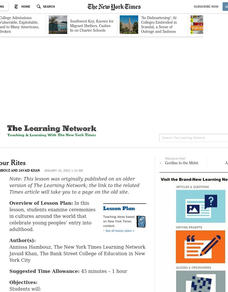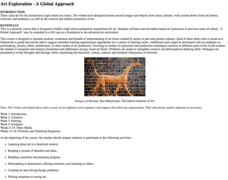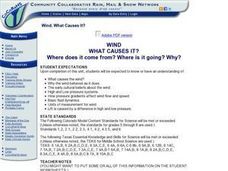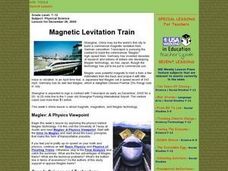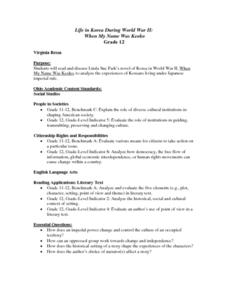Curated OER
Why Nations Trade
Students discuss international trade focusing on opportunity cost and the principle of comparative advantage. They engage in a simulation activity based on different countries and their economic benefits.
Curated OER
Science of Special Effects
This is a creative, multidisciplinary, well-designed lesson provided by Scientific American related to special effects. Students make their own animated short films and use math and computer skills.
Curated OER
A Whale of a Difference
Students research various perspectives on Japan's commercial whaling industry and formulate position papers representing these views. They read the Times article, Yuk! No More Stomach for Whales. Groups present their perspectives on...
Curated OER
Know Your Rites
Students examine ceremonies in cultures around the world that celebrate young peoples' entry into adulthood.
Curated OER
Art Exploration-A Global Approach
A high school unit focuses on a discipline-based study of artworks from many times, places, and cultures. Addressing historical works of art as well as modern techniques, the unit illustrates how a traditional organizational...
Curated OER
Do We Need a Permanenet International Criminal Court?: War Crimes, Violence, International Law and Politics, Nuremberg
In this lesson, students explore the history, relevance and current application of international tribunals for war crimes. Students look at cases from the Nuremberg trials, Tokyo trials and the Bosnian War.
Curated OER
Hamlet and the Elizabethan Revenge Ethic in Text and Film
Students discover how Shakespeare's play interprets Elizabethan attitudes toward revenge, as reflected in the structure of the Elizabethan revenge tragedy, one of the most popular forms of drama of that era. Students perform certain...
Curated OER
Where Is Japan? How Are We Alike And Different?
First graders use literature, maps, and globes to explain how physical environments in various parts of the world are similar to and different from one's own, and that certain areas have common characteristics and can be called regions.
Curated OER
Play with Words: Rhymes & Verse
Students listen to poems and rhymes, clap out syllables, and sing along with familiar tunes. They use puppets and crafts to help recall and retell favorite poems, and craft their own poems.
Curated OER
Love It or Leave It?
Students identify flags by country, then research the symbolism and history of those flags in preparation for writing and delivering oral presentations. For homework, they write essays reflecting on the relationship between flags,...
Curated OER
Fish Stories
Young scholars conduct background research about a Pacific Rim country to develop a premise for a documentary film about the fate of traditional fishing industries in the area.
Curated OER
Wind, What Causes It?
Students explore what causes wind, why wind behaves as it does, early cultural beliefs about wind, high and low pressure systems, basic fluid dynamics, units of measurement for wind, and how lift is caused; students create and fly kites.
Curated OER
Changes in Western Art: From Realism To Cubism"
Middle schoolers discover the influences of mid 19th and early 20th century art styles: Realism, Impressionism, Post / Neo Impressionism, Fauvism, Cubism through an analysis of styles, subject matter, and media.
Curated OER
Anon Methought the Umbrellas Began to Move
Students reenact a scene from Macbeth using umbrellas as props.
Curated OER
Keeping Us in Stitches Activity: Crazy-Quilt Collage Design
Students create collages using the irregular-shaped and sized pieces, decorative stitching, and applied or painted motifs that reflect the Crazy-Quilt style, and explain how and why their design fits into that style.
Curated OER
Imperialism Political Cartoon Assessment
Students work from topics provided by the teacher to create a political cartoon that illustrates imperialism throughout the world, focusing on that which led up to World War One.
Curated OER
Magnetic Levitation Train
Young scholars use the Internet to discover the physics behind Maglev technology. They examine properties of magnets at Canada's Science and Technology museum. They participate in tutorials in which they can observe how different objects...
Curated OER
Life in Korea During World War II: When My Name Was Keoko
Twelfth graders review facts about roles of Asia and Japan in World War II, read When My Name Was Keoko to familiarize themselves with daily life and historic events during World War II in Korea, and participate in student-led...
Curated OER
When My Name Was Keoko
Students construct a book banquet to help us to recall and enjoy food eaten in Korea during the 1940's. The class is to read When My Name Was Keoko and then create a book banquet that the students invite their parents to. Students cook...
Curated OER
The Science of Sound and Musical Instruments
Students identify the components of sound. They describe the relationship between pitch and frequency and explain the terms sympathetic vibrations and resonance.
They perform simple experiments about the world of sound and explain the...
Curated OER
Racism, Discrimination, and the Law
Seventh graders examine the various racism and discrimination faced by various ethnic groups in the United States. In groups, they research the legal system and describe the purpose of the United States Constitution. They review cases...
Curated OER
Loose and Tight Monetary Policy
Young scholars discuss goals of tight or loose monetary policy, act as advisers to heads of various nations' central banks to determine whether countries should pursue tight or loose monetary policy, and present realistic solutions...
Curated OER
Boggle's World: November Lesson Plan, Classroom English: Getting It Right From the Start
Young scholars learn to ask for information when they don't understand what was said to them. Students work in groups and practice asking prepared question from cards provided by the instructor.
Curated OER
Language Arts: Conversing with an Object
Learners sharpen their creative writing skills by writing dialogues with unfamiliar objects while visiting local museums. They select an object in the museum, such as a painting, and create conversations between the people or animals...
Other popular searches
- Japanese Film
- Japanese Art and Music
- Japanese Culture
- Japanese Internment
- Japanese Art
- Japanese Internment Camps
- Japanese Folk Tales
- Japanese Literature
- Japanese Cooking
- Japanese Calligraphy
- Japanese Poetry
- Japanese Americans





